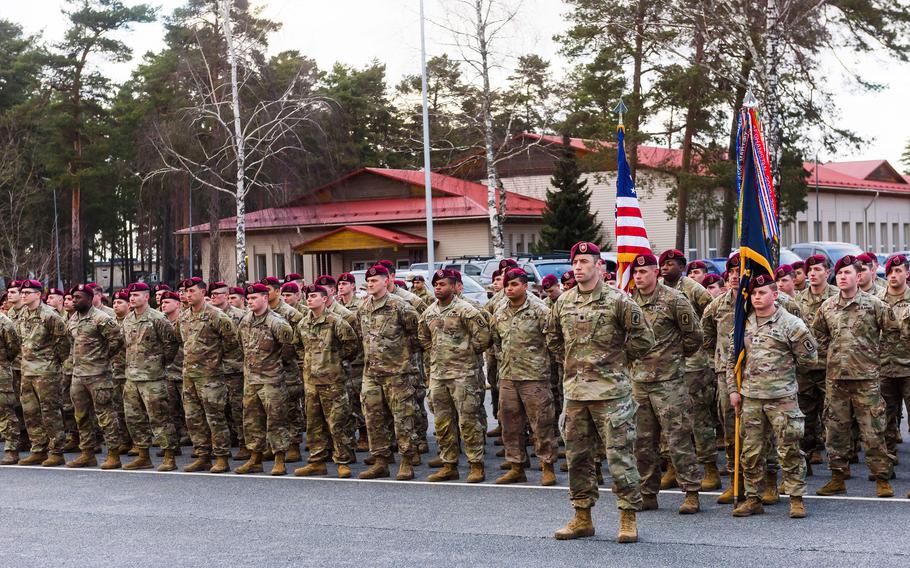
Soldiers of an airborne brigade of the U.S. Army stand at the Adazi Military Base of the Latvian armed forces in Adazi, Latvia, on Friday, Feb. 25, 2022. (Gints Ivuskans/AFP/Getty Images/TNS)
(Tribune News Service) — According to its ever-running television commercials, USAA insurance caters exclusively to members and veterans of America’s armed services and their families.
Now a federal judge in San Diego has granted class-action status to a lawsuit filed by two enlisted service members who accused the insurer of shunting them into more expensive policies than those offered to officers.
The company, which is officially known as United Services Automobile Association, was sued in 2021 by Eileen-Gayle Coleman, a Marine Corps radio operator from Oceanside, and Robert Castro, an Army culinary specialist from Banning in Riverside County.
The two enlisted service members who each purchased USAA insurance policies said the company steered them into products that charged higher premiums than those imposed on military officers.
“USAA advertises, ‘We know what it means to serve,’” the initial complaint alleged. “It claims to ‘respect and honor the men and women in our nation’s military and their families who support them.’
“But as shown by its pricing of automobile insurance policies and its deceptive business practices, USAA respects and honors current and former military officers more than it does current and former enlisted personnel,” the complaint added.
The case was brought by Consumer Watchdog, the Los Angeles advocacy nonprofit that works to keep premiums low by intervening in insurance rate cases. Two Washington, D.C., law firms also are representing the plaintiffs.
USAA, which has as many as 200,000 policyholders in California that could be members of the represented class, said the allegations in the lawsuit lack any merit.
“California law allows USAA to serve members in the manner we do, and our rates are examined and approved by regulators,” a company spokesperson said by email.
“We remain committed to providing competitive products and exceptional service to the military community,” he added.
In court, company lawyers said the dispute should be decided by the California Department of Insurance and argued against certifying it as a class-action case.
The insurance company’s lawyers did not respond last week to a request for comment about the allegations or the judge’s finding.
In a 58-page ruling issued late last month, Judge Robert S. Huie granted and denied motions by both parties. The class-action aspect of the case could move forward to determine whether USAA applied “good driver” discounts equally between enlisted personnel and officers, he said.
“The court concludes that a class action is a superior means of adjudicating this case,” Huie wrote.
According to the ruling, USAA is comprised of multiple companies, two of which are defendants in the lawsuit. One, known as United Services, mostly serves military officers. The other, USAA General Indemnity Corp., or GIC, generally serves enlisted service members.
Once base rates are established, the judge’s ruling noted, a series of “rating factors” affects the final premium. The class-action litigation will decide whether USAA deliberately steered customers into GIC policies that largely served enlisted military personnel, thereby denying them the lowest premium possible under “good driver” discounts.
“Plaintiffs allege that USAA’s practice of separating policyholders between GIC and United Services ‘discriminates against enlisted military personnel and enlisted veterans by consigning them to its substandard insurance company,’” the ruling noted.
Washington lawyer Jay Angoff, who is co-representing the plaintiffs, said he was pleased that his clients will get their day in court.
“Those people had a right to get the cheapest coverage for a good driver that USAA provides,” he said in an interview.
The case had a trial date scheduled for later this year, but the proceeding has been pushed back. The lawsuit will be decided as a bench trial, meaning it will be resolved by the judge rather than a jury.
USAA can appeal the class-action certification ruling to the federal appellate court if company lawyers choose.
©2024 The San Diego Union-Tribune.
Visit sandiegouniontribune.com.
Distributed by Tribune Content Agency, LLC.